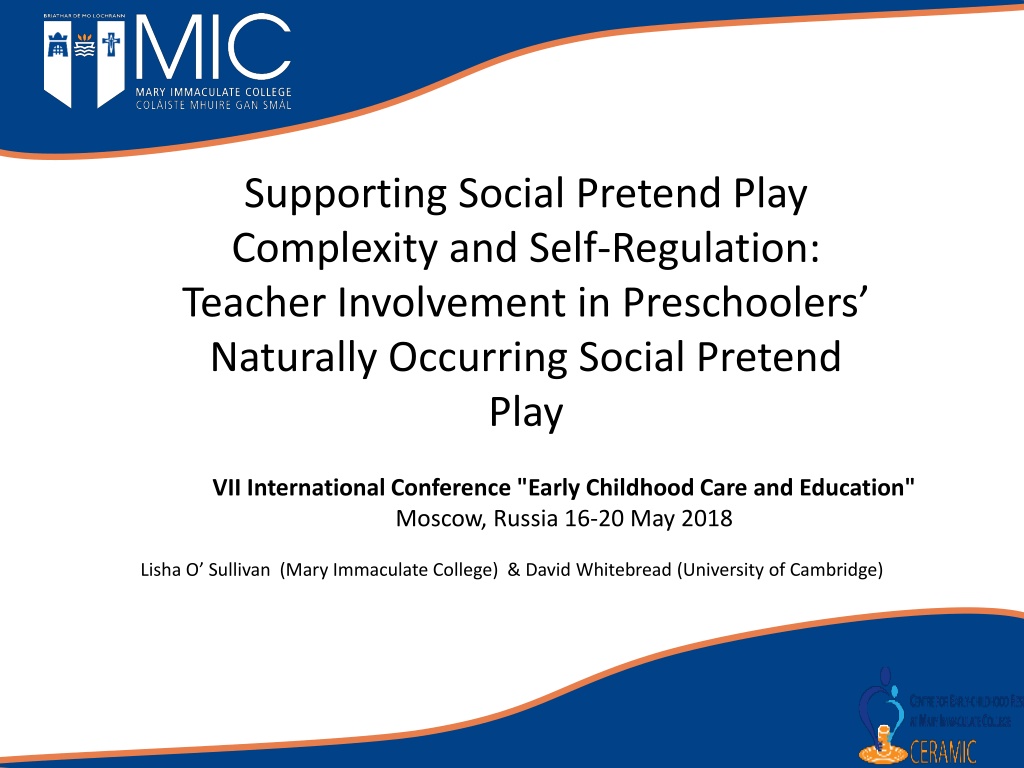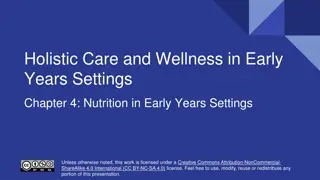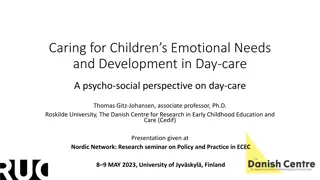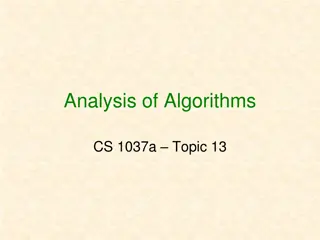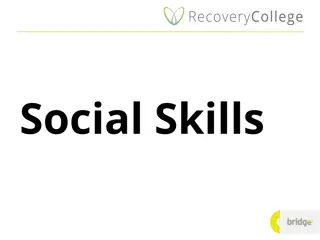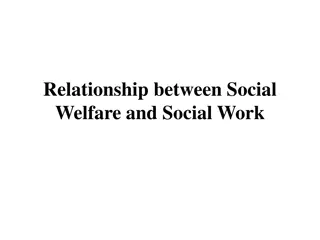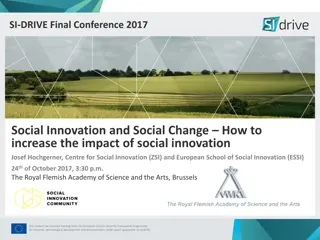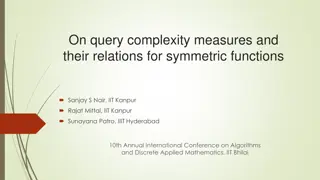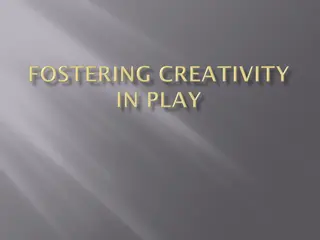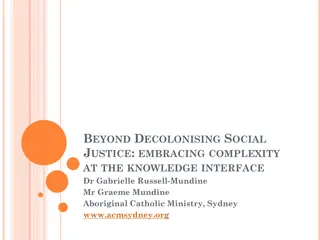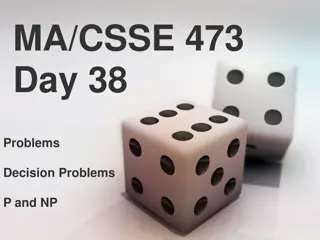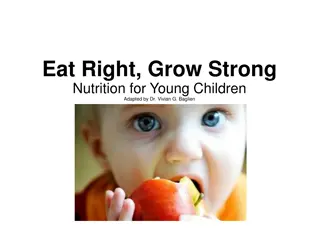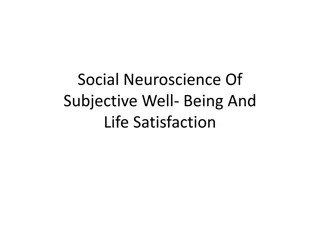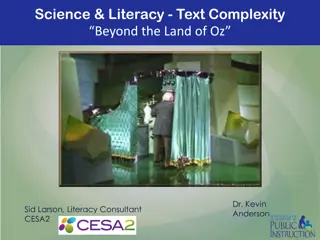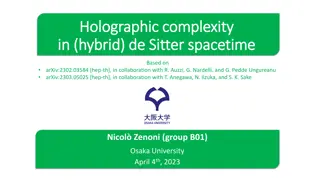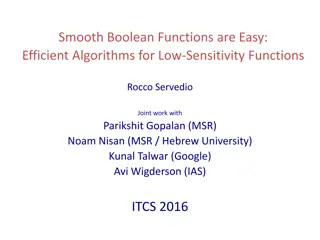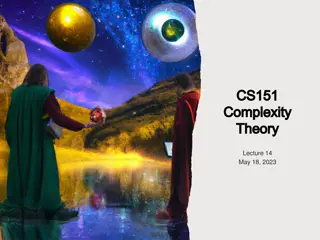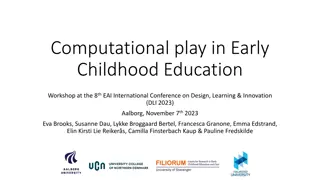Supporting Preschoolers' Social Pretend Play Complexity
This study explores the significance of self-regulation and adult involvement in preschoolers' social pretend play, focusing on the complexity of play and its impact on children's self-regulation skills. The research investigates how teachers' interactions during play influence children's engagement in more complex social pretend scenarios. Through observational methods in early years settings, the study aims to enhance understanding of the relationship between adult involvement, play complexity, and self-regulation in young children.
Download Presentation

Please find below an Image/Link to download the presentation.
The content on the website is provided AS IS for your information and personal use only. It may not be sold, licensed, or shared on other websites without obtaining consent from the author.If you encounter any issues during the download, it is possible that the publisher has removed the file from their server.
You are allowed to download the files provided on this website for personal or commercial use, subject to the condition that they are used lawfully. All files are the property of their respective owners.
The content on the website is provided AS IS for your information and personal use only. It may not be sold, licensed, or shared on other websites without obtaining consent from the author.
E N D
Presentation Transcript
Supporting Social Pretend Play Complexity and Self-Regulation: Teacher Involvement in Preschoolers Naturally Occurring Social Pretend Bachelor of Arts in Early Bachelor of Arts in Early Childhood Care and Education Childhood Care and Education (BAECCE) (BAECCE) Play VII International Conference"Early Childhood Care and Education" Moscow, Russia 16-20 May 2018 Lisha O Sullivan (Mary Immaculate College) & David Whitebread (University of Cambridge)
Overview a) Background b) Aim c) Methodology c) Results e) Conclusion www.searchcreativecommons.org
The Significance of Self-regulation During the Preschool Years The Development of Self-Regulation During the Preschool Years Self- Importance for Well-being and Achievement Regulation Conditions which Support Children Developing Self-regulation during the Preschool Years McClelland et al., 2013; Blair & Raver, 2014; Whitebread et al., 2015;
Social Pretend Play Creating a Zone of Proximal Development for Self-Regulation A meaningful context to practice self-regulation Social Pretend Play & Self- Regulation More complex social pretence requires greater self-regulation Today s preschoolers are engaging in less complex social pretend play The role of Adult involvement in social pretence for Supporting complex play and self-regulation Karpov, 2005; Whitebread et al., 2009; Whitebread & O Sullivan, 2012; Bodrova & Leong, 2015
Research Questions 1) Do children engage in more complex social pretend play when adults become involved in the play? 2) Does adult involvement in social pretend play influence children s use of self- regulation skills? 3) Do teachers interactions during social pretend play reflect the characteristics of effective pedagogy for self-regulated learning?
Methodology PhD Research. Observational study. Video-recorded data collected on social pretence during free-play time across nine early years settings. The first phase of the study addressed a separate set of research questions exploring social pretend play with peers. This phase on social pretence with adult involvement involved a representative sub-sample of 20 children aged 3- 6-years (7.6 hours of data). Data was analysed on each child s social pretence with peers and social pretence with adult involvement. Adult interactions were also coded along a number of lines. Mixed methods. 6
Coding Social Pretend Play Complexity Simple Social Pretend Play: children engage in social play and both children perform pretend acts. These acts may have been temporally related or have involved similar toys. Associative Social Pretence: Children engage in social pretend play and there is evidence of roles or storylines. Roles may be adopted in the absence of a storyline or a storyline may be developed without obvious roles. Cooperative Social Pretence: Children engage in social pretend play and there is evidence of a storyline and there is an obvious relationship between the roles being enacted. Complex Social Pretence: Children plan, take on and sustain roles which are clearly complementary. Storylines are played out in an increasingly detailed way and demonstrate narrative like qualities. (Bretherton, 1984; Fein & Schwartz, 1986; Garvey, 1991;Howes & Matheson, 2002; Leong & Bodrova, 2012)
Results: Level of Social Pretend Play Complexity in Play with Peers and Play with Adults Associative Social Pretense Cooperative Social Pretense Play with Peers 12 children 8 Children Play with Adult Involvement 0 children 20 children Social Pretend Play Complexity in Play with Peers and Play with Adult Involvement
Coding: Metacognitive & Self-regulatory Behaviours Social Nature of Regulatory Processes Metacognition & Self-regulation Metacognitive Knowledge Knowledge of persons, tasks, strategies Metacognitive Regulation Monitoring, evaluation, planning and control strategies Emotional & Motivational Regulation Emotional and motivational monitoring and control (The C.Ind.Le coding framework- Whitebread et al., 2007) Self-regulation Other-regulation Shared-regulation (Operational Definitions of Self, Other, and Shared Nature of Regulation Processes-Iiskala et al., 2004) 9
Results: Metacognitive Knowledge, Metacognitive Regulation, Emotional & Motivational Regulation 10
Results: Social Nature of Regulation Processes 11
Sharing regulation of the play Amelia: Now why don't we go to am to am to to the shop? Lucy: Oh we're not buying stuff again! Mary: We're not buying! Teacher: Do we need to eat first then ? Ameila: Look we have to no- why don't we go to the restaurant? Conor: Look- a restaurant down stairs! Teacher: Are we going to a restaurant? Ameila: Ya! www.searchcreativecommons.org 12
Characteristics of Effective Pedagogy for Self-regulated Learning Feelings of Control Emotional Warmth & Security Claire is the doctor and is treating the educator who is in the role of patient. Claire is finding it difficult to get the bandage to stay on the educator s sore hand : Claire: Putting on I'm just wrapping it around Educator: Will I hold one side while you wrap it? Jason: I'm not finished and he keeps on taking my seat (at reception) Teacher: Well you will have to sort it out because I don't work here. I'm just a customer. Jason: He won't let am he won't let me Teacher: Well you will have to ring the manager Jack: Ok you win (lets Sam have chair) Teacher: There seems to be an awful lot of fighting, who is the manager? Jack: He's just gone out
Characteristics of Effective Pedagogy for Self-regulated Learning Cognitive Challenge Articulation of Learning In this the educator encourages Sam to call out a telephone number: Teacher: I' m going to ring Jennifer; will you tell me Jennifer's number, what s the number? Sam: One Teacher: One Sam: Two Teacher: Ya Sam: Three Teacher: Ya Sam: and zero, that's the number! In this example the educator makes explicit Maggie s reasons for want the children to wear life-jackets going on the boat : Maggie: a life jacket, Lara, wear a life jacket Teacher: Oh good idea Maggie, they are very important Maggie: I'm going to have that one Teacher: OK Maggie: and Mary is going to have that one Teacher Do you want this life jacket? (to Mary) Maggie: Well I'm going to have my life jacket (Mary does not accept the life-jacket ) Teacher: Good idea Maggie, it will keep you safe in the water won't it?
Results: Characteristics of Effective Pedagogy for Self-regulated Learning Figure 1 Relative Proportions for Educator Interactions coded as promoting Emotional Warmth and Security, Feelings of Control, Cognitive Challenge and supported Articulation of Learning
Conclusion Preschool aged children in this sample did not engage in complex or mature social pretence In order to encourage more complex social pretence, adult interactions may need to be calibrated to suit children s play level. Adult involvement in naturally occurring social pretence does not reduce children s opportunities to practice self-regulation. In preschool contexts, different types of activities seem to promote specific aspects of self-regulation. www.searchcreativecommons.org
References Blair, C., & Raver, C. C. (2014). Closing the achievement gap through modification of neurocognitive and neuroendocrine function: Results from a cluster randomized controlled trial of an innovative approach to the education of children in kindergarten. PLoS ONE, 9(11), 1-13. Bodrova, E., & Leong, D. J. (2015). Vygotskian and post-Vygotskian views on children's play. American Journal of Play, 7(3), 371-388. Bretherton, I. (1984). Representing the social world in symbolic play: Reality and fantasy. In I. Bretherton (Ed.), Symbolic play the development of social understanding (pp. 10-39). Orlando: Academic Press. Fein, G., & Schwartz, S. S. (1986). The social coordination of pretense in preschool children. In G. Fein & M. Rivkin (Eds.), The young child at play: Reviews of the research, Volume 4. Washington D.C: National Association for the education of young children. Garvey, C. (1991). Play (2nd ed). London: Fontana Press.
References Howes, C., & Matheson, C. C. (1992). Sequences in the development of competent play with peers: Social and social pretend play. Developmental Psychology, 28(5), 961-974. Howes, C. (2011). Social play of children with adults and peers. In A. Pellegrini (Ed.), The oxford handbook of the development of play (pp. 231- 244). New York: Oxford University Press. Iiskala, T., Vauras, M., & Lehtinen, E. (2004). Socially shared metacognition in peer learning? Hellenic Journal of Psychology, 1, 147-178. Kravstova, E. (2014). The Sage handbook of play and learning in early childhood (L. Brooker, M. Blaise, & S. Edwards, Eds.) (A. Maximov, Trans.). London: Sage. Leong, D. L., & Bodrova, E. (2012). Assessing and scaffolding make-believe play. Young Children, January 2012. Meyers, A. B., & Berk, L. E. (2014). Make-believe play and self-regulation. In L. Brooker, M. Blaise & S. Edwards (Eds.), The sage handbook of play and learning in early childhood (pp. 43-55). London: Sage. 20
References Whitebread, D., Kuvalja, M., & O' Connor, A. (2015). Quality in early childhood education: An international review and guide for policy makers. Report for the world summit for education. Dohar: WISE. Whitebread, D., & Coltman, P. (2011). Young children as self-regulating learners. In J. Moyles, J. Georgeson & J. Payler (Eds.), Beginning teaching: Beginning learning: In early years and primary education (pp. 122-138). Maidenhead: Open University Press. Whitebread, D., & O' Sullivan, L. (2012). Preschool children's social pretend play: Supporting the development of metacommunication, metacognition and self-regulation. International Journal of Play, 1(2), 197- 213. Whitebread, D., Coltman, P., Pino Pasternak, D., Sangster, C., Grau, V., Bingham, S. et al. (2009). The development of two observational tools for assessing metacognition and self-regulated learning in young children. Metacognition Learning, 4(63-85). 21
